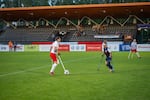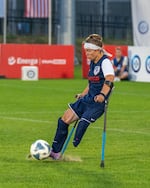
Polish and American amputee soccer players, shown here in a provided photo, compete at the Polish Amputee Soccer Cup in Warsaw, Poland, on Sept. 19, 2023. Amputee soccer originated in Seattle in the 1980s as a way for amputee athletes to get out on the pitch.
Nigel Degraff/U.S. Amputee Soccer Association
An accessible version of soccer with Northwest roots is slowly gaining traction in the sports world.
Amputee soccer was created in Seattle in the 1980s as a way for athletes with only one leg or arm to get out on the pitch. It’s been gaining momentum ever since, with teams and conferences across Asia, the Americas, Europe and Africa.
“It’s really catching on worldwide. People injured in wars and things like that, the numbers are increasing, and this is a sport they can play,” said Thuy Williams, a staff member with the U.S. Women’s National Amputee Soccer Team who is based in Portland.
Amputee soccer is played much like the original, but with a few modifications. The field is slightly smaller, and there are only seven players to a team rather than 11.
Goalies typically only have one arm, and other players must have a one-inch difference in their legs to be eligible to play. Most notably, players use forearm crutches to balance, run and kick.
“You have to be a little more agile. It’s a lot faster — people can move on those crutches,” Williams said. “It’s amazing to watch.”

Katie Bondy, shown here in a provided photo, competes at the Polish Amputee Soccer Cup in Warsaw, Poland, on Sept. 19, 2023. A lifelong athlete, Bondy first started playing amputee soccer about six months after she had her leg amputated.
Nigel DeGraff / U.S. Amputee Soccer Association
Katie Bondy first started playing amputee soccer in January 2023, about six months after she had her leg amputated. She now plays on the women’s national team while also working as a high school science teacher outside of Columbus, Ohio.
She said the sport offers disabled athletes a welcoming community, as well as a chance to compete.
“Not being the disabled person on the team is great because in amputee soccer, everybody is disabled,” Bondy said. “For me, personally, it’s a great atmosphere to be around.”
A lifelong athlete who was born with spina bifida, Bondy often had to request modifications to be able to compete with her peers in youth sports. She said her experience might have been different if she knew that she qualified for amputee soccer growing up.
“I’m not going to say my path would have changed, but just having that option of having a community — I probably would have taken more advantage of that,” she said.
On Jan. 13, the U.S. Amputee Soccer Association will host a clinic in Portland to allow new players to learn the game and advanced players to develop their skills.
Williams, who helped organize the clinic, said two of the sport’s founders will be on hand to talk about their experience and help with the workshops.
“We’re just going to learn what it is, have some fun and end the day with a scrimmage,” Williams said.
As an added bonus, both the men’s and women’s national teams recruit from clinics like the one in Portland. The women’s team is set to compete in Colombia this November at the first-ever Women’s Amputee Soccer World Cup.
“My goal is to bring someone from Portland to play in the women’s World Cup team this year,” Williams said. “I can work with them between now and actual tryouts in May, and I’m hoping we have someone from Portland on that team.”
Bondy is also focused on earning a spot to compete in the inaugural tournament.
“I’m training every day. I’m working on my crutch skills, my foot skills, my nutrition,” she said. “So you know, here’s hoping.”
Thuy Williams and Katie Bondy spoke with “Think Out Loud” host Dave Miller. Click play to listen to the full conversation:
